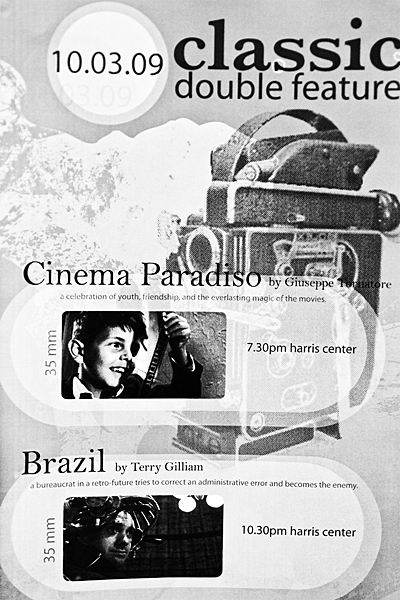
There’s something about Director Terry Gilliam’s Brazil that exceeds itself. It’s a film that should ultimately be unrelentingly depressing and cynical, a portrayal of a futuristic Orwellian dystopia where machines manhandle their owners and bureaucracies make machines of men. Setting the film in Britain, Gilliam takes retro noir sets and fills them with gizmos that are absurdly elaborate enough to be funny. Similarly entertaining are the bureaucrats, the endless repression and the superficiality of its captives, and the squalid shadowy aura this stuff is buried in.
All of it is rendered with the kind of daffy love that evokes the best British screwball comedy. Gilliam wants to explore the kind of traps society can lead itself into—to vividly illustrate the perverse ways our society can condition us to behave. Even so, this film lacks a practical response to issues of totalitarianism in a technology-centric culture. It prefers to revel in the madness of these problems and, in its indifference to solutions, it is somewhat childlike.
And yet, somehow, in the craft behind the daft, Gilliam demonstrates the most obvious solution to all the horror—his own elastic and ingenious imagination. Gilliam provides us with a protagonist as spirited as he is. A low-level governmental bureaucrat, Sam Lowry (Jonathan Pryce) seems like a bit of a prat on the outside. Consistently interrupted by his superiors, always desiring to leave a nice impression yet incapable of leaving a strong one, Lowry often earns our pity. His quiet decency is made even more poignant by the dire predicament his job forces him to investigate.
Due to a hilariously unlikely bureaucratic mishap involving a housefly and a typewriter, Britain’s police unjustly arrest Harry Buttle, mistaking him for terrorist Archebald “Harry” Tuttle. Much of the film consists of Lowry nobly trying to rectify this fiasco and getting into more and more trouble the harder he tries.
But don’t think Lowry’s spiritedness simply stems from moral rigor. The real kinship Lowry and Gilliam share is one of imagination. Lowry has complexly rendered fantasies about a blond beauty, the two of them soaring together flirtatiously, suspended in mid-air by a jaw-dropping, seemingly infinite expanse of steely file cabinets. It is a lush daydream, one that reassembles the raw materials of bleak future-Britain into something transcendent and fun enough to be redemptive. Lowry spends his day-to-day existence in a living nightmare. But what does it matter, when the stuff of nightmares can birth the prettiest fantasies?
There are two theatrical versions of Brazil. There’s Gilliam’s director’s cut, 142 minutes long. And there’s the originally released version (spoiler alert), six minutes shorter, with a somewhat ambiguously happy ending and derisively referred to as the “Love Conquers All” version—the implication being that the original version shows evil winning out. Yet our cinematic gut tells us that in Brazil love does conquer all, with or without the extra six minutes. In Brazil, love is imagination, the ability to wrap the dreamiest embellishments around the nitty-gritty of what-really-happened. By underlining the absurdities in his futuristic Britain regime, Gilliam strips it of its monstrous power. And by escaping into his madcap fantasies, Lowry proves—in a cheerfully non-Orwellian fashion—that even oppression has its limits.



















































